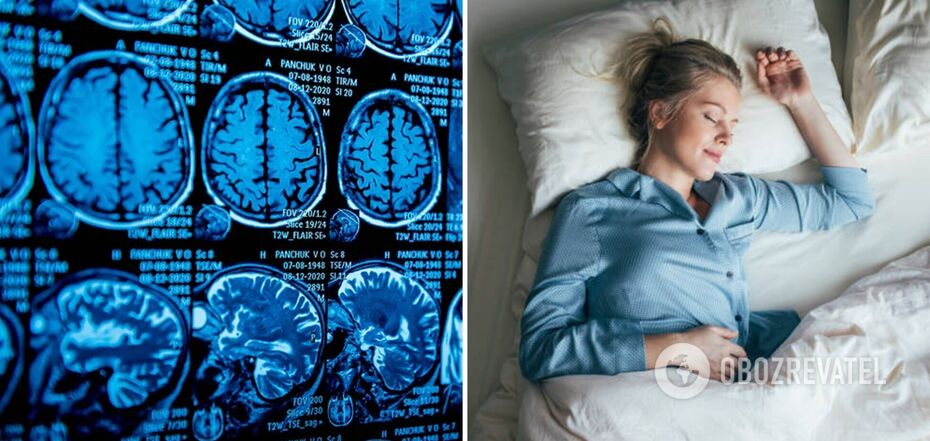Society
What happens to the brain when we sleep: Researchers have solved the mystery
The human body, though it seems to have been studied up and down, but it still harbors hundreds of unsolved mysteries. Most of them, of course, are related to the activity of the brain, an absolutely unique organ that has evolved to a state where it is able to look into the depths of space and into the smallest details of the atom.
But one of the mysteries of the brain, it seems, we are slowly beginning to unravel. According to Live Science, researchers have learned quite a bit about what sleep is, why we need it, and what happens to our brains when we sleep.
First of all, sleep is definitely very important. So important, in fact, that it has been found in all of the animals that scientists have observed. Even fruit flies, roundworms, and jellyfish sleep, as Dr. David Risen, associate professor of neuroscience at the University of Pennsylvania, reported. And since evolution has preserved sleep for all animals, even though during sleep we are vulnerable to predators and essentially wasting time, its importance is truly great.
Sleep, or trying to sleep, takes up a third of our lives. And when we don't get enough sleep, we begin to function poorly - our reaction speed and cognitive abilities drop, even if we don't get enough sleep just once. Thus, according to Risen, scientists conclude that it is the brain that is most important for sleep.
{"imgSrc": "https://i.obozrevatel.com/gallery/2022/2/10/cat-g520778be41920.jpg", "imgWidth":1920, "imgHeight":1371, "title": "Sleep should be regular.", "sourceTxt": "pixabay.com", "alt":""}
We have two phases of sleep - slow and fast. In slow sleep, waves of brain activity fade, muscles relax, and breathing slows down. And when the fast phase arrives, brain activity rises to approximately the level of wakefulness. Studies have shown that REM sleep accounts for 20 percent to 25 percent of the time we sleep, and it is during this phase that we have the most vivid and fantastic dreams.
According to the American National Institute of Neurological Disorders and Stroke (NINDS), the thalamus, a large mass of gray matter located in the middle of the brain, is activated during the fast phase. Institute researchers suggest that it is it that sends us images, sounds and other sensations that fill our dreams.
At the same time, Johns Hopkins Medicine says that the neurotransmitter acetylcholine is active during REM sleep, and its levels rise sharply during waking hours. Scientists believe that this substance helps the brain retain information gathered and remembered while asleep. That's probably why learning something just before going to sleep is often so effective.
And also during sleep, the brain "takes a bath" of cerebrospinal fluid and blood. This is the conclusion reached by the authors of a study published in 2019 in the journal Science. It's likely that understanding the nature of these brain-washing cycles can help study age-related disorders and disorders that are often associated with sleep disturbances, including autism and Alzheimer's disease.
{"imgSrc": "https://i.obozrevatel.com/gallery/2022/2/4/people-g13061c22b1920.jpg", "imgWidth":1920, "imgHeight":1280, "title": "It is not yet completely clear whether lack of sleep causes diseases or diseases disrupt sleep.", "sourceTxt": "Pixabay", "alt":"}
According to Professor Reisen, the brain does not stop working while we sleep, keeping us alive, but it has some special tasks during sleep. For example, it is during this time that the growth hormone is produced, metabolic waste is cleared, and the strength of neural connections changes.
So a study that saw the light of day in 2017 in the journal Nature Medicine showed that sleep deprivation impairs the ability of brain cells to communicate with each other. And this entails impaired memory and visual perception. The study's lead author, Dr. Itzhak Fried, professor and director of the epilepsy surgery program at the University of California, Los Angeles, noted that sleep deprivation also deprives neurons of the ability to function properly.
In addition, it has already been proven that disrupted sleep patterns are associated with such negative consequences as the development of type 2 diabetes, cardiovascular disease, obesity, depression, and other diseases. However, it is too early to say whether sleep deprivation leads to somatic diseases or vice versa. "There are many observable poor health conditions that correlate with poor or insufficient sleep, but it is difficult to know whether poor sleep causes these problems. For example, it is possible that very early dementia causes poor sleep and not the other way around," Professor Risen states.
He also told Live Science that it is still not entirely clear why we sleep and how we do it. "What brain centers are involved in the initiation, maintenance and termination of sleep? What brain chemicals are involved? How does the brain switch from fast sleep to slow sleep?", the scientist listed just a few questions. Science has yet to figure out these intricacies.
As OBOZREVATEL wrote, some foods can interfere with healthy sleep. It is better to avoid them in order to fall asleep faster and not wake up in the middle of the night.



























